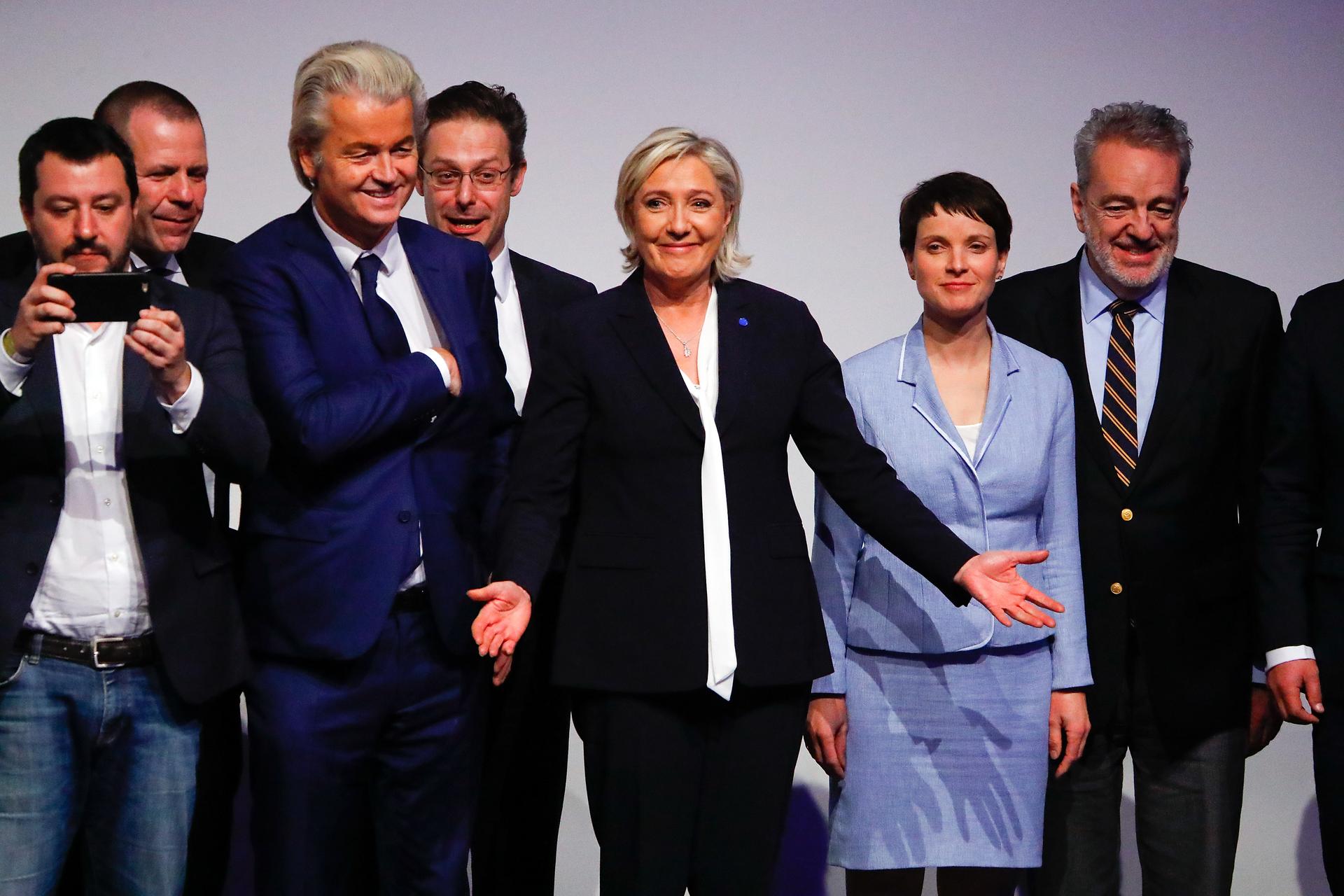Right-winger Le Pen vows continental Europe will ‘wake up’ in 2017
Germany's Alternative for Germany (AfD) leader Frauke Petry, France's National Front leader Marine Le Pen, Italian Matteo Salvini of the Northern League, Netherlands' Party for Freedom (PVV) leader Geert Wilders, Harald Vilimsky of Austria's Freedom Party (FPOe) and Marcus Pretzell, ENF group member of the European Parliament pose on stage after a European far-right leaders meeting in Koblenz, Germany, January 21, 2017.
French presidential hopeful Marine Le Pen on Saturday told a European gathering of rightwing populists in Germany that a string of high-stakes elections in 2017 would blow a wind of change across the region.
Emboldened by the Brexit vote and Donald Trump's US presidential victory, the far-right National Front leader said voters in France, Germany and the Netherlands would be next to reject the status quo.
"2016 was the year the Anglo-Saxon world woke up. 2017, I am sure, the people of continental Europe will wake up," she told a cheering crowd at a conference hall in the western city of Koblenz, on the river Rhine.
"It's no longer a question of if, but when," she added in a speech that railed against migration, the euro and open borders.
Billed as a "European counter-summit", the Koblenz gathering is also being attended by Frauke Petry of the anti-immigration Alternative for Germany (AfD), Geert Wilders of the Dutch anti-Islam Freedom Party, Harald Vilimsky, secretary general of the Freedom Party of Austria and Matteo Salvini of Italy's anti-EU Northern League.
It comes just a day after the inauguration of Trump, who assumed power with a staunchly nationalist address in which he vowed to put "America first".
'Good PR'
The Koblenz participants have repeatedly voiced their admiration for the maverick billionaire, and like him are hoping to shake up the political landscape by capitalizing on a tide of anger against the establishment and anxiety over migration.
"Yesterday a new America, today Koblenz and tomorrow a new Europe," Wilders, sporting his trademark peroxide hairdo, told the 800-strong crowd in German.
"We are the start of a patriotic spring in Europe," he said to loud applause.
The charismatic Dutch MP, who has vowed to ban the Koran and pull his country out of the European Union, currently tops polls ahead of March parliamentary elections.
But observers say he will likely struggle to find the coalition partners needed to govern.
The Koblenz congress, the first of its kind, has been organised by the European Parliament's Europe of Nations and Freedom (ENF) grouping, which was set up by Le Pen in 2015 and now brings together 40 MEPs from nine member states.
It has been touted as an opportunity for the parties to highlight their common ground but political analyst Timo Lochocki of the German Marshall Fund said the event was mainly "just good PR" as the parties had little to gain from strengthening ties.
"This is largely to increase media attention," he told AFP. "The reasons why people vote for these parties are purely national and are independent from any alleged cross-national cooperation between the far-right."
The meeting of some of Europe's most divisive politicians has stirred controversy in Germany.
Some 3,000 demonstrators protested against the event under the banner "Koblenz stays colourful — No room for rightwing populism," organizers and police told AFP.
They displayed cardboard cutouts of Hitler, Stalin and Mussolini, and some protesters carried signs that read "If you sleep through democracy, you wake up in a dictatorship."
More than 1,000 police officers have been deployed to keep the protests peaceful.
Controversy
Chancellor Angela Merkel has ruled out meeting Le Pen ahead of the French polls, with her spokesman saying the French far-right politician's policies have nothing in common with the German government's.
Le Pen hit back at the perceived snub on Twitter.
"I am going to Germany to meet its future, the AfD, not its past, the CDU," she wrote, referring to Merkel's conservative party.
In the run-up to the congress, AfD MEP Marcus Pretzell, Petry's husband, triggered widespread criticism when he announced that several German media outlets had been denied accreditation because of their perceived bias.
AfD co-chief Petry meanwhile came under fire for taking part in the meeting at all, with some prominent members questioning whether the party should be cosying up to Le Pen, and in doing so, lurching further to the right.
The AfD started out as an anti-euro party but has since gained ground by railing against Merkel's liberal refugee policy, which has brought over a million asylum seekers to the country since 2015.
Petry used her speech to again lash out at the record influx, slamming the establishment's calls for tolerance "while hundreds of thousands, millions, of mostly illiterate young men from a far and partly violent culture invade our continent."
The AfD is polling at between 11 and 15 percent, ahead of a general election in September, boosting its chances of becoming the first hardline rightist party to enter Germany's parliament since 1945.
Every day, reporters and producers at The World are hard at work bringing you human-centered news from across the globe. But we can’t do it without you. We need your support to ensure we can continue this work for another year.
Make a gift today, and you’ll help us unlock a matching gift of $67,000!
